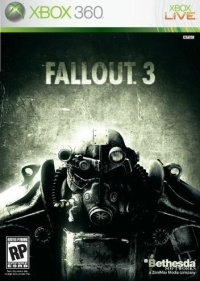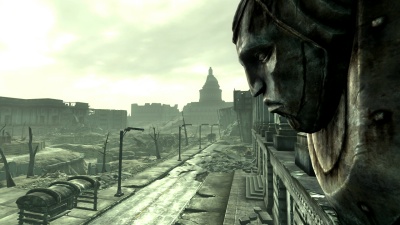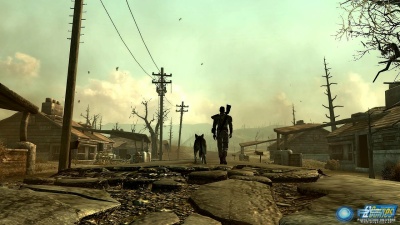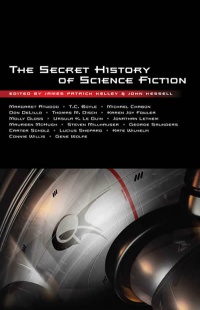 Post-apocalyptic stories abound in science fiction, in novels and movies far too numerous to list. For some reason we just love seeing the world wiped out by disaster, and have a fascination with the broken landscape that remains afterward. For those who share this interest, and who also like to play a good game from time to time, there couldn’t be a more perfect game than Fallout 3.
Post-apocalyptic stories abound in science fiction, in novels and movies far too numerous to list. For some reason we just love seeing the world wiped out by disaster, and have a fascination with the broken landscape that remains afterward. For those who share this interest, and who also like to play a good game from time to time, there couldn’t be a more perfect game than Fallout 3.
The game takes place a couple of hundred years after a nuclear war that occurred in the late 21st century. So, while the world is basically a wasteland, the environment (architecture, vehicles, etc.) has a slightly futuristic look to it. And while humanity is still devastated and downtrodden, there are pockets of high technology here and there, and groups struggling to rebuild society and/or grab power for themselves. You play a character who grew up in an underground facility built to protect a small group of people during the war. When your father leaves the vault under mysterious circumstances, you decide to go out into the big bad wasteland and find him. And that’s when the real fun begins.
The action takes place in the remnants of Washington D.C. — the Capitol Wasteland — and the surrounding countryside; and this shattered post-nuclear landscape is beautifully presented. The crumbling buildings and roads, the isolated sections of raised freeway, the abandoned cars, everything is portrayed in fine detail and contributes to a satisfyingly haunting atmosphere. And while there are plenty of other characters to interact with, one of the most appealing parts of the game is simply the ability to roam around and explore the ruins, whether it’s the sinister subway tunnels, the rubble-choked streets, D.C. landmarks (Capitol building, Washington monument, Arlington Cemetery), or the open hills and grasslands outside the city.

The game packs in a lot of sci-fi elements besides the post-apoc setting. There are mutant humans in several varieties, giant mutant scorpions and ants, robots, runaway androids, a certain sub-plot that bears a strong resemblance to The Matrix, futuristic weapons, and other assorted pieces. There is also a huge amount of space to explore. After I finished the main story sequence, I realized that there were still huge areas of the map I hadn’t even touched. Obviously there were many side quests I missed out on, making me eager for a replay (something I don’t often do with games).
There seems to be quite a bit of flexibility in how you play the game, as far as what kinds of skills you develop and in your basic moral stance. My first time through I played pretty much the straightforward “good guy,” so next time I think I’ll try the dark side and be an evil S.O.B. As far as mechanical aspects, the controls and such, I have no complaints. Everything was easy enough to learn quickly and use effectively. There are a couple of features I did like. One is the ability to switch between 1st and 3rd person views. Another is the targeting system by which you can attack specific parts of an enemy’s body. Oh, one other point in the game’s favor: the voice of Liam Neeson.

Plenty of exhilarating combat here, as well as a decent story to immerse yourself in. But the best part by far is simply the exquisitely-drawn atmosphere of a ravaged post-nuclear world. Roaming these wastelands was some of the most fun I’ve had from a game in some time.



















